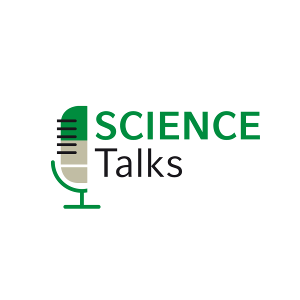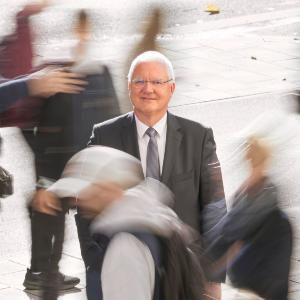“We want to explore areas of friction”
17 Oct 2022
To mark the launch of Science Talks, we talk to Vice President Oliver Jahraus about the role of science in society.
17 Oct 2022
To mark the launch of Science Talks, we talk to Vice President Oliver Jahraus about the role of science in society.

In view of the global crises in which we’re embroiled, science and society are faced with almost unprecedented challenges. LMU is launching a new format called Science Talks to promote public dialog about urgent research subjects.
Moderated by Professor Oliver Jahraus, LMU Vice President for Teaching and Studies, LMU experts will be talking to guests from various sectors of society – including research, politics, and business – about the role science plays in today’s society.
The eight-part series begins on October 25 as a physical, in-person event at LMU and as a livestream.
People are looking to science very specifically to come up with solutions to fundamental and everyday problems.Oliver Jahraus

Professor Oliver Jahraus, LMU Vice President for Teaching and Studies, will moderate the Science Talks. | © LMU/Jan Greune
Climate change, the pandemic, and geopolitical uncertainty are dominating public debates at present. What expectations do people have of science in relation to these challenges?
Oliver Jahraus: The demands being made of science are extremely high, and in its public perception and in the value placed on it by society, the role of science has assumed dimensions which it did not possess a few short years ago. The questions as to what significance science has and can have, what claims to validity it makes, and the manner in which it responds to challenges to its validity, are becoming more urgent and more complex. And although basic research in particular operates in a realm beyond the everyday reality of most people, science nonetheless affects people up close and personal when it comes to things like getting vaccinated.
People are looking to science very specifically to come up with solutions to fundamental and everyday problems. This trend has been apparent since COVID-19 emerged, but now further crises (energy crisis, inflation, political crises of a new kind) are confronting us. Science is butting up against social discourses, expectations, and even political scenarios, and we must be clear to ourselves and others about what science can do and what’s outside its scope. With Science Talks, we want to explore these boundary lines and the resulting areas of friction.
Where do you see the largest sources of friction between the demands being made of science and what science can actually do?
I believe that the largest source of friction springs from confusion about different modes of inquiry. And as overworked as the pandemic often is as an illustration of this and that, it does provide a very fitting example here. Universities do basic research to a great extent, and scientists have furnished answers to many fundamental questions. However, large swaths of the population may view problems very differently, especially in times of crisis. That’s how you can tell that these are two different ways of looking at problems. Science asks fundamental questions!
A second source of friction lies in the timeframe in which answers are provided. In science, the time horizon tends to be much more distant. Today’s discovery needs time before it reaches people’s everyday lives. This is what makes the swift development of the COVID-19 vaccines such a fascinating counterexample.
And thirdly, I’d like to address questions of validity: Where and how can science claim validity or even utility? Science can lay out its findings, but it’s not there to make binding decisions. That’s the job of other social players or systems, such as politics, which raises the question as to the extent to which politics should listen to science or rather follow its own logic – and indeed this is one of the issues we’ll be exploring. Science can contribute to public discourse by communicating knowledge. It can invite people to take part in this discourse – including people from outside the world of science. And our Science Talks this winter semester will serve exactly this purpose. So, universities play an important role in knowledge transfer. But how scientific findings become social reality is in and of itself not a scientific task. However, it can be a scientific question, and one moreover that the Science Talks will address.
We’ll be asking what characterizes the particular relationship between science and society in our daysOliver Jahraus
The Science Talks are a new format for initiating dialog between science and society. What’s different about the approach?
The Science Talks have a long backstory. For 2019, we had planned a traditional lecture series on the theme of “Truth and Method.” We wanted to investigate how science arrives at its findings, which it then wants to convey, and how important the methodology is for transferring knowledge and for claims of scientific validity. But this lecture series was thwarted by the pandemic. Instead, we devised a substitute with a completely new virtual format featuring active audience participation. This was the form in which the Corona Lectures and later the AI Lectures were delivered.
Now we’re returning to the original idea in some respects while refining the contents and form: the contents by delving deeper into the relationship between science and society in the light of these unusual times and making this relationship itself the subject of scientific discussion. We’ll be asking what characterizes the particular relationship between science and society in our days? And from the formal, technical perspective, we’ve created an innovative hybrid lecture in which all the audience – those physically present and those who join the proceedings online – will have the opportunity to take part via an online tool. We want to have a physical, in-person event and we want participation in the event to be possible without having to be physically there.
Finally, we concluded that if discussion was so important to us, and if we are exploring how science is nested in society, then the lecture itself should take the form of a discussion. In a discussion, content and form mutually determine each other. As such, we don’t need presenters so much as interlocutors. And so we arrived at the format of the Science Talks, for which we invited colleagues at LMU to speak with experts from outside.
The lecture series is a major showcase for LMU.Oliver Jahraus
What do you mean by outside?
Outside means outside of LMU, but also outside of the university ecosphere and outside of science. Most of our guests come from other walks of life. One example is politics and business, where we’ll be welcoming former CEO of Siemens, Joe Kaeser. To discuss health policy, we’ve secured the participation of President of the Robert Koch Institute (RKI), Lothar Wieler – incidentally, an LMU alumnus. Mr. Wieler occupies a fascinating position between two social systems: He’s a scientist first of all, but as the President of RKI during a pandemic he also holds a highly politicized office. Furthermore, we’ll be looking at a variety of other social systems such as religion.
The lecture series is a major showcase for LMU, and we want to demonstrate what we can do. To accentuate the discursive nature of the enterprise and the coming together of different viewpoints, we’ve broadened out the group of participants for the opening event in the Science Talks, which will take the form of a panel discussion. Christina Berndt from the Süddeutsche Zeitung newspaper will moderate the event – personally, I can’t wait for it.
In which areas do you think discussion is most sorely needed?
COVID-19 has not gone away. That is to say, medical-scientific aspects will still be very much in demand. But the other major challenges of our time will also feature prominently – such as climate change, economic crisis, the relationship between science and democracy, the role of science in our culture of remembrance, the role of religion(s) in society/societies, indeed the whole concept of the Anthropocene, which says that humans are now the transformative force on and for our planet. That will be a big topic. Then of course there is the matter of conspiracy theories. ‘Conspiracy theory’ is a curious expression, because the second word is ‘theory.’ And theory is a scientific mode of discourse. Yet conspiracy theories are the exact opposite of science. Nevertheless, the fact that this phenomenon has huge effects on democracy also poses a challenge to science.
In addition, the talks will cover economic questions such as: With inflation soaring, what will happen with our money? How are the relevant economic decisions made – and by whom? How is our society in fact economically constituted? It’s very interesting to observe what this looks like from the perspective of those who make economic decisions that influence the fortunes of a company, but which also have broader macroeconomic effects.
Another fascinating subject is our culture of remembrance. We all know our history, we cultivate our memory of the past, and yet antisemitism exists. How is this possible and what does it actually mean for society? What fundamental dangers threaten social order from this quarter? This, too, we want to discuss.
In essence, science has always been, from its earliest days, nothing less than figuring out to overcome limits.Oliver Jahraus
Scientific knowledge is increasingly being called into question by sections of the public, and fake news and conspiracy theories are proliferating. Are there limits to the transfer of scientific knowledge to society?
Yes, I do believe that there are limits. But these limits lie outside of science. I don’t think that there is scientific knowledge that is intrinsically beyond people’s capacity to appreciate. But there are certainly limits to communicability. For instance, we quickly come up against banal problems – when a scientific paper has to be compressed into 100 lines for a newspaper article, for example, or when there is exactly 40 seconds of airtime available to broadcast a science story. Absolutely, there are limits here.
On the other hand, science must always ask itself: How should we address people? How can science communicate its own relevance beyond instances of everyday utility? Things have certainly changed a lot in this regard. The parameters for communication have become much tighter, and communicators bump up against these limits relatively quickly. But throwing your hands up in the air when you encounter some limits is not the scientific way. In essence, science has always been, from its earliest days, nothing less than figuring out to overcome limits.
Science Talks:Registration